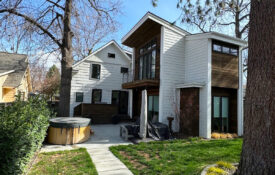In a survey of 1,300 people in Los Angeles County, they found powerful evidence that negative feelings about developers drive negative feelings about development, possibly even more than the drive to avoid perceived harms.
Locals often object to new buildings or increased density in their neighborhoods, whether we’re talking about subsidized homes, apartment buildings, or backyard cottages—and whether or not they may believe in principle that their community needs more homes. Opposition to new homes can hobble community goals for affordability and sustainability. But what if people dislike development because they don’t like to see developers profit? And what if the rules that result—ones that punish developers—in reality encourage only the most deep-pocketed, aggressive developers, preclude all but the most expensive kinds of homes, and wind up punishing the community instead?
Maybe we’ve been interpreting opposition wrong? We usually attribute motivations for objections to risk aversion, whether straightforward—like concerns about rising rent, increased traffic congestion, loss of neighborhood “character,” and strains on infrastructure—or complicated, unfounded, or contemptible, like when resentments of newcomers or race and class bias play into people’s calculus.
But in a study of neighborhood opposition to new building, UCLA researchers Paavo Monkeonen and Michael Manville find that perceived harm is just part of story. A more powerful motivator for opposing new housing may be the drive to punish someone else. Namely, developers.
In a survey of 1,300 people in Los Angeles County, they found powerful evidence that negative feelings about developers drives negative feelings about development, possibly even more than the drive to avoid perceived harms. Specifically, Monkeonen and Manville report that “opposition to new development increases by 20 percentage points when respondents see the argument that a developer is likely to earn a large profit from the building.” The research is experimental and deserves more study, but this magnitude, they report, is double the increase in opposition associated with other more commonly stated concerns like traffic.
All of the usual housing attitudes hold true in this study: People are more likely to oppose the same building when it is in their neighborhood, as opposed to elsewhere. Messages about congestion, or infrastructure, or character do help build opposition to development. But the most powerful opposition frame is about the developer. “When we told survey respondents that a developer may have received special permission to build, and that he would make a large profit, they became far more hostile to new housing—more than with any other frame.”
What’s surprising here is not that people dislike developers, but the distinct departure from risk aversion as a driver. Instead of acting in their own interest, people appear motivated to enforce community norms of fairness.To punish developers feels like one way to disrupt a pattern of winners and losers. This helps explain the popularity of regulations that impose costs on developers—such as linkage fees, exactions or inclusionary zoning ordinances. “If residents derive satisfaction from seeing developers punished,” they write, “the persistence of these programs in the face of ambiguous evidence about their efficacy becomes less mysterious.”
But it could backfire. Monkeonen and Manville remind us that stopping developers—and their homebuilding—in thriving cities can punish others instead. Housing prices would remain high, which exacerbates segregation by income and race, pushes people to longer commutes, and shifts gentrification pressure from wealthier to less-affluent neighborhoods. Our progress toward affordability in cities where housing supply is short may require a shift in thinking about what’s truly fair and for whom. Could we shift away from developers to a focus on people who can or cannot afford certain neighborhoods? Could that interpretation of fairness trump indignance about developer profit?
To be fair, there are reasons that developers are cast as villains in everything from city council meetings to countless movies. (There’s even a database of “evil movie developers.”) Developers are the most visible—embodied—agents of change to places people care about. We remember them not for benign stuff, like developing the neighborhood or building we’re in right now, but for the kinds of devastating changes they’re associated with—from undercutting poor communities to clearcutting for golf courses.
Plus, as the researchers point out, people may consider development an inherently “repugnant market.” When so many struggle to afford a home, in other words, the idea of profiting from housing might seem morally inappropriate. Even if the overall effect is to make more homes available and keep a city affordable, if the transaction itself seems ethically or morally wrong, the social benefits can be lost or ignored. It’s even worse if people believe developers are courting favor and bending the rules, Monkeonen and Manville say. And these narratives about developers likely play into more widespread cynicism about business and the wealthy.
In that context, suggesting we try to recast developers as partners rather than adversaries is farfetched. But Monkeonen and Manville warn that anti-developer attitudes might lead to a vicious cycle of regulation and resentment: Preventing developers from what feels like unsavory gains prompts regulatory clamp downs that discourage all but the deepest-pocketed and most aggressive developers from building. So by punishing developers, we not only risk thwarting affordability—and punishing people who need homes—but also discourage all but the the least likable developers and most expensive projects (think: luxury). This reinforces stereotypes about developers and locks in a cycle of repugnance, objection, and stalled progress. As Monkeonen and Manville put it, “Blocking the product to punish the producer has a visible short-term consequence that might look progressive (assuming the developer is in fact rich) but a less-visible long-term consequence that lands on vulnerable people elsewhere.”
Again, trying to change how people feel about developers will be a steep climb. But to break out of the cycle of regulation and resentment and break down opposition, we’d be wise to recalibrate our collective definition of fairness. The same good-hearted people who want to sock it to developers might be convinced that developers making a profit is a worthy trade off for communities where homes of all shapes and sizes are available and attainable to neighbors of all income levels. Could they see developers as necessary and important tools for fair and moral community goals, even if they have to hold their nose?











Michael Andersen
A few months ago I came across this book that made an interesting argument about transportation politics in Chicago during the decline of streetcars and the rise of personal cars: that private ownership of a public service created political resentment toward that service. Seems to me there’s a possible housing analogy.
https://quod.lib.umich.edu/cgi/t/text/text-idx?c=acls;cc=acls;rgn=div1;view=trgt;idno=heb99038.0001.001;id=nt_c06.n36;note=ptr
When Chicago’s electorate was still fairly evenly divided among car and transit commuters, the dominant political rhetoric was “balance the modes, help everybody.” So the city would try to invest $1 million in a new rail platform and $1 million in some new road paving. Fair enough, right?
But as documented by Barrett, at least, this started to break down because rail service was private. The guy who ran the private rail company became seen as a villainous profiteer with every fare hike, which undermined political support for rail expansion, which became seen as a “subsidy” for the private rail company as opposed to the “public” paved roads that were supposedly open to all. (In reality, of course, the roads were being closed to everyone not wealthy enough to own a car, in the same way that a city that underbuilds housing closes housing to everyone not wealthy enough to secure one of the ever-appreciating existing homes…) The city capped transit fares, which starved the rails of operating revenue. The lack of investment in either infrastructure or service sent rail into a death spiral.
I don’t want to read too much into this hypothesis—after all, similar things happened in basically every U.S. city simultaneously, despite varying ownership situations for rail service—but it made me wonder whether a more active role for the public in the development process could lead to a different public perception of the public’s stake in housing production.
Richard L Layman
thanks for the cite. Sounds like a great book. I snagged one from Abebooks for $3.75 as opposed to $30 on Amazon. There’s still one at Abebooks at that same price.
Stephen Rees
At one time governments accepted that there was a need for some intervention in housing markets. Currently, right wing philosophy dominates: all government is seen as bad. Even prisons and prosecuting wars abroad have been privatised.
Equally, when HUD put up huge projects, the designs were hideous and inhuman, and many have had to be torn down.
So we are left with developers as the only possible agency that can build anything, and then we are surprised that they should seek to make profits.
Either we have to seek out other ways of building places – and there are other ways – or we have to come up with a planning process that does not treat the existing community with contempt. People who “buy in” to a home (and that includes people who pay rent as much as owners) decided on the location based on what they saw at the time. And the longer they live in a place, the more they see it changing and not always in ways that suit what they wanted when they first arrived. But when they try to influence what is built next they are sure to be villified as NIMBYs, just because they want to take care of the place they value.
Too many politicians and planners think that they know better than the locals what should be built and how. And too often the consultation process is based on an almost colonial condescension. The “needs” of growth are always seen as more significant than the needs of the community. And anyway, in the minds of the bureaucrats, the only people who come out to the open houses or town halls are people who have strong opinions that are antithetical to any and all development.
We can actually do better – but to do that we actually have to have a better development process, one that actually is capable of listening. And looks at a broader range of alternatives than more of the same.
Peter Normand
There is literally little room to do better, any and all parts of a city have a constituency that want to keep things the same, views and neighborhood character can’t be permanently preserved in a city that is growing and has to house new people moving into the metro area or a particular neighborhood. Deferring to the wishes of neighborhood residents who “know better” would almost always stymie growth of the housing supply and eventually curtail economic growth of the city all the while housing prices continue to climb as supply is limited in the areas people want to live. If we had to get permission form neighborhood residents to allow new people to move in, by way of providing new housing, we would likely reinforce segregation. For a city planner or zoning commission to abdicate their responsibility to novices who only have their own individual local interest in mind cities would end up like San Francisco, close to a tipping point where gentrification and climbing housing cost threaten to erase the underlying culture of an entire region.
Jesse
I believe you meant to use the term “people who build housing.”
Joseph Tieger
Developers are seen as making obscene profits at the public expense. The developer of a major project in Tacoma, WA bragged that he was making 30-40% return while getting public subsidies for infrastructure, property tax deferments on the structures which are high value apartments and condominiums and, adding insult to injury, was not paying the property tax when due but deferring payment for the maximum two-years effectively shifting annual costs to the public. It is not that the public objects to developers making a profit but to their gaming the system to squeeze every dollar from the public while frequently adding directly and indirectly to public costs. Developers do not care what harm their project does to the value of adjacent homes, or to the environmental or cultural features of the community. All too often Developers are able (with the assistance of the real estate agents) to coerce local politicians into allowing development in hazardous areas (see: coastal N & S Carolina, FL), floodplains (See: Houston). Having sold what they built the developer is gone when the costs of their chicanery comes due. When dealing with development proposals it is not just buyer beware, it is community beware. Developers are seen as not giving any concern to anything but their bottom line.
Marc Goodson
I breezed through the article so forgive me if you mentioned that most developments are a blight on humanity. Housing developments, especially those in the sub-burbs, taking up farm land are designed with cheap materials and are blatantly ugly. No developer seems to consider the natural landscapes they carve out for their cookie cutter houses nor do they understand the potential market for green built houses, using natural sustainable materials, and techniques such as earth burms and living roofs moving towards sub-terranian improving energy efficiency, homes that are safer to live in from an earthquake or fire standpoint and much more beautiful blending into nature. Most homes are using petrol based products that are unhealthy to live in and cause harm to the environment during the manufacturing process.
Steve
A positive economic indicator is housing starts. Can you imagine a society that does not depend on population increases to drive such an indicator? Developers profit from sex!
Richard L Layman
I have to read the paper but I think that people seize on the “developers making money” trope merely as a way to criticize a project that they oppose generally, regardless of “developers making money.” This is capitalism after all.
In LA, transit activists who say rail is for whites have criticized the rail plans as designed to make money for construction and engineering firms, calling it “corporate welfare.”
https://la.streetsblog.org/2012/10/30/bus-riders-union-transit-justice-not-corporate-welfare-no-on-measure-j/
note the photo in this LA Times article, showing a “corporate welfare” check from LA MTA (Metro) to Parsons Brinckerhoff:
http://articles.latimes.com/2012/oct/20/local/la-me-transportation-tax-measure-20121020
In Suburban Maryland outside DC, saying that the light rail program is merely so “developers can make money” has been mentioned by opponents in letters to the editor in the Washington Post and the now no longer published Gazette suburban newspapers.
In my own community, “developers making money” has been used to criticize proposals for a multiunit housing building on the Metrorail station property, etc.
I think in all of these cases, concerns raised about developers, construction companies, and engineering consulting groups like Parsons making money is misdirection.
They’re just seizing on that trope to provide what they think is an argument that doesn’t appear to be self-serving.
Sarah Westover
Maybe one of the reasons people dislike the idea of developers making lots of money is because often their private gain comes at the expense of the most marginalized and exploited people in our communities. Many developers will tell you that what they are most concerned with their bottom line. So who makes sure we are building what our communities actually need-not just what makes developers the most money?
In the face of a nationwide housing crisis, we know we need higher density, multi family, and afforable housing. Even so, developers build luxuary condos and large single family dwelling units on large lots. That’s what happens when we cede almost all of our the decision making around building housing, a public necessity, to private companies. It’s about the bottom line, not the public good.
Some communities are reclaiming a small amount of that decision making power by adopting policies that require more fairness in housing development like upzoning, density bonuses or like Inclusionary Zoning. This article literally calls inclusionary zoning a desire to “punish developers”. Inclusionary zoning is not a punishment but a tool for cities to use to incentivize developers to build a certain proportion of multi-unit developments to be affordable to the people who live there. In Oregon, cities MUST offer an incentive of some form including SDC deferrals, property tax abatements, parking offsets and a whole range of other options to help offset development costs. Policy change that seeks to help communities in crisis and address systemic inequities in housing isn’t punishing developers. It’s just not letting them have ALL of the power over what our communities look like and who gets to live there.
Maybe people arent just out to make developers feel bad for kicks. Maybe there are good reasons for people to resent the system as it currently is. Maybe the solution to that isn’t just easing up our attitudes about developers because they are our only option to build, as this article seems to suggest. Maybe we should also support non-profit developers and public developers. Maybe we should see reasonable regulations on delopment not as a punishment but a way to reduce displacement and homelessness while still allowing private developers to make their bottom line.
In the future I hope that Sightline will include perspectives from people displaced by the housing crisis and from organizations seeking policy change around housing. Those perspectives are definitely lacking here.
Morgan
Interesting article and great comments.
I appreciate and value Sightline’s efforts to move the needle on housing affordability as an agent for urban density and the consequent benefits to commute distances, enabling of transit and human powered transportation, and many other vectors of resource conservation. I also realize this is a social dilemma more than one of science or knowledge, but I’m just not yet sold on this the theme of anti-developer emotions.
I’m a general contractor whose company mainly does residential remodeling and water damage repair. From my experiences in the latter, I’m coming to believe more firmly that developers are indeed greedy and uninterested in outcomes past contract and past final payment. Mistakes certainly happen during construction, but I see a ton of shoddy work by design and omitted best practices. I know they knew better.
In healthy markets, profits are normal. In markets with barriers to entry or with imbalances in access to capital or to information or to labor, for example, profits increase for some and decrease for others. If developers are making lots of profit, perhaps there are problems with the market.